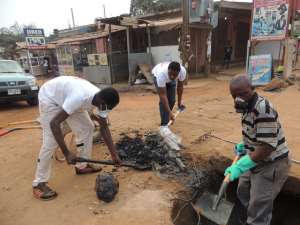
The Deputy Minister of Local Government and Rural Development, Nii Lantey Vanderpuye, has blamed the insanitary conditions in the country on the country's transition from traditional rule to its current democratic system of governance.
'What I am about to say I know it's controversial but I must say this: maybe democracy is not good for us as a people,' he said, and added that 'because people are taking advantage of our democratic dispensation to litter and degrade our environment.'
Nii Lantey Vanderpuye was speaking at the launch of a new sanitation project dubbed 'Ghana Clean City Project' by a UK-based non-government organisation (NGO), Tears of Africa, on Wednesday in Accra.
Ghana Clean City is a five-year initiative designed to reverse 'bad societal attitude towards the environment through the use of competition to challenge, drive and motivate local authorities, mayors, district chief executives and community members to take ownership of their environment.'
The deputy minister claimed that democracy has weakened many traditional norms and value systems which hitherto compelled individuals to keep their surroundings clean.
'We have broken down the sort of cultures that make us to be unique people,' he said.
According to him, government has not been able to take stringent measures against individuals who flout sanitation laws due to fear of being criticised by Civil Society Organisations (CSOs) and the media.
He said today some people, particularly CSOs and the media, interpret punitive measures as molestation, adding that human rights groups do not allow government to take certain actions against people who violate sanitation laws.
'When I beat people for littering their surroundings, DAILY GUIDE will put me on its front page first of all that 'Violent Nii Lantey Goes On Rampage,'' he said, pointing out that government has been receiving negative publicity from a segment of the media for its actions against persons who violate sanitation laws.
The end result, he posited, has been the littering of cities and towns across the country, as persons who are fond of littering are not severely punished to serve as a deterrent to others.
The insanitary conditions in the country have led to the outbreak of diseases, particularly cholera which recently killed about 200 persons.
The Water Governance Advisor of the Embassy of the Netherlands, Elsie Apau, urged government to strengthen its institutions to be able to address the insanitary conditions in the country.
'Institutions must be made to work to realise results from initiatives that are being carved out every day,' she said.
According to her, the Dutch government has set up a fund to be made available to individuals who have bright initiatives towards bringing an end to the sanitation problem in Ghana.
Executive Director of Tears of Africa Kobby Fabian, in a brief remark, disclosed that the 10 regional capitals and districts across the country were going to participate in the campaign borne out of the collaborative efforts of his outfit, the Government of the Netherlands, the Ministry of Environment and the Ministry of Tourism.
He stated that Tears of Africa has, as part of its strategy to drive local communities through the concept of self-development, outlined a five-year development plan on sanitation, primary healthcare, aqua-marine preservation, national tree planting and education.
He was optimistic that the initiative will help bring an end to the sanitation crisis confronting the nation.
BY Melvin Tarlue




 Chairman Kingsley Owusu Brobbey calls for Privatization of Electricity
Chairman Kingsley Owusu Brobbey calls for Privatization of Electricity
 Train accident: Four more grabbed and remanded
Train accident: Four more grabbed and remanded
 Gov't to consolidate cash waterfall revenue collection accounts
Gov't to consolidate cash waterfall revenue collection accounts
 Gov't to settle lump sum for retired teachers by April 27
Gov't to settle lump sum for retired teachers by April 27
 Former PPA CEO granted GH₵4million bail
Former PPA CEO granted GH₵4million bail
 Dumsor: The darkness has exposed you; you’ll go down as the worst in Ghana’s his...
Dumsor: The darkness has exposed you; you’ll go down as the worst in Ghana’s his...
 Dumsor: The ‘incompetent’ person provided a timetable whiles those who came to s...
Dumsor: The ‘incompetent’ person provided a timetable whiles those who came to s...
 Defend, ensure NPP’s good works are ‘sold’ and highlight the ‘bad’ state of the ...
Defend, ensure NPP’s good works are ‘sold’ and highlight the ‘bad’ state of the ...
 Bawumia will rank high ahead of Mahama in any anti-corruption test — Salam Musta...
Bawumia will rank high ahead of Mahama in any anti-corruption test — Salam Musta...
 NPP trying to bribe us but we‘ll not trade our integrity on the altar of corrupt...
NPP trying to bribe us but we‘ll not trade our integrity on the altar of corrupt...
